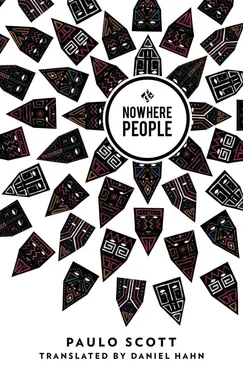Days later. Today Catarina has understood the reason for his fixation with the Sheraton. His target is actually the Sheraton restaurant: the president of the National Indian Foundation has lunch there when he comes to Porto Alegre to visit his girlfriend.
When he received the medical diagnosis the day before yesterday confirming that the youngest of his three daughters, the one aged a little over one and a half, has hearing problems — ‘She suffers from severe auditory deficiency,’ the doctor reported — what the employee who looks after the swimming pool at the Nautical Union Guild club felt was self-hatred, a hatred at having no way of meeting the costs of the surgery and the other hugely expensive treatments they had ahead of them. He tried in vain to sleep, and in the morning he couldn’t look at his wife, he couldn’t eat his breakfast. He needs a loan because he has no more time to lose; he went to his parish church to speak to the priest, but it was too early, he knew it was too early, the priest only arrives around ten. He wasn’t able to wait, the bus took longer than usual. He lives a long way from the club. He arrived at the Nautical Union Guild to explain his absence from work the previous night and attempt to get his manager to excuse it. He had to wait for the meeting that the manager was attending to come to an end. His colleagues told him about a madman who was causing absolute mayhem outside the Moinhos shopping mall, which is the one at the Sheraton Hotel. At the time he attached no particular significance to this, but when he left the club, dazed, even with his manager having signed off his absence, the club employee thought it would not be a bad idea to go up to Quintino Bocaiuva towards 24 de Outubro, turn onto Tobias da Silva and walk on as far as Félix da Cunha.
The next thing he knows, the club employee is standing outside the Sheraton Hotel in the middle of a crowd of teenagers and curious bystanders, watching the guy wearing a carved wooden board that looks like nothing else on earth. Two cameramen, and two others who appear to be assisting them, are filming as though there were something important happening. The club employee can’t see very well (the young people are all too tall). The man in the mask is talking into the microphone attached to the stand in front of him; his voice is not being amplified, it’s only there to capture audio for what is being filmed. The club employee feels comfortable in the midst of all that pandemonium, he isn’t alone. He wants to touch the guy somehow, to listen to him. He approaches. ‘I’m not trying to make enemies, I’m not trying to destabilise anyone but, for all the reasons I’ve explained, I’m not going to leave the government alone, still less the president of FUNAI, this gentleman who spends more time travelling around Europe than signing papers in his office or visiting the indigenous lands occupied by farmers, by employees of the mining firms and all sorts of modern-day prospectors.’ He stops for a moment. ‘I’m not going to leave this gentleman alone, just as I’m not going to leave the National Health Foundation alone, nor the section of the police and the judiciary that are in hock to the colonels of the North, the Northeast, the Centre-West, dangerous people who at this very moment are with absolute impunity designing a plan to criminalise indigenous leaders using falsified evidence … accusations with no legal basis … protecting the slaughter of whole tribes … ’ A very beautiful girl approaches the masked man to tell him that the FUNAI president’s girlfriend is arriving in a taxi. The masked man speaks (the club employee is close and can hear): ‘I challenge the Ministry of Justice and the President of the Republic to launch a complete review of the processes in which the leaders of the indigenous communities in these three regions have been condemned … As of today, I will give the government thirty days to dismiss the president of FUNAI … I … ’, and he pauses. He walks the short distance to where the club employee is standing. ‘You ok?’ … The club employee is startled. ‘What?’ The masked man goes on. ‘You helped me in the pool the other night. I could have drowned … ’ The club employee is confused. ‘You’re that kid? Why’re you doing this?’ he asks. One of the cameramen positions himself beside the club employee so as to better frame his face. The surrounding crowd begins to shout (they cannot know why exactly). ‘Isn’t it dangerous for you, to be talking about the government like that?’ he says, bewildered. ‘The people who occupy indigenous lands, they’re the dangerous ones.’ The club employee tries to speak but cannot. ‘All ok with you?’ asks Donato. ‘Me? I, um … I found out … ’ — he feels worn out — ‘that my youngest daughter is deaf.’ The masked man tries to comfort him. ‘I’m so very sorry for you.’ It seems to be an effort for the club employee to speak. ‘I’m sorry, but there isn’t anything you can do for her, is there?’ Donato stammers (when Donato is wearing the mask he never stammers), ‘M-m-me? Bu-but what could I do?’ The club employee closes his eyes. ‘I know you can’t … I just thought … I had to ask … because once you’ve missed your chance … I, I … don’t know … We could do a swap … I … I can’t seem to … ’ The club employee leans on the mask, and even Donato letting go of the handles to try and hold him is not enough to prevent him from fainting and his body hitting the ground.
Lucinho Constante, president of FUNAI, needs another two years to finish creating the plan that he has been presenting at government seminars as ‘the brand new, rationalised synthesis of the most successful programmes for the inclusion of indigenous peoples in the western world’. From Canada to New Zealand, he is testing the results (and he is sure he is headed in the right direction). He hates bureaucracy, he hates civil servants, those who have passed the public examinations and those with tenure, he hates the idiocy of the sertanistas who claim to be protectors of the forest and are really nothing but loudmouths with no ability to listen to, and support, their own families, who make endless claims about their love for the tribes that continue to hold out against the white man, but who lack the serenity to remain alert to the more fundamental demands of the day-to-day. He hates the alienation of academics, that breed that should be helping to discuss solutions, those fat peacocks; he hates those who don’t mind killing and those who don’t mind when others kill. He can’t bear to hear any more about the Raposa Serra do Sol reserve; he can’t bear to hear yet again that in nineteen such-and-such governor so-and-so liberated whatever lands in order to plant rice, soya, to extract timber; he can’t bear to hear any more about the Federation of Indigenous Organisations of the Brazilian Amazon, about the Central Coordinating Organisation of Isolated Indians. His trips to Porto Alegre are his way of hanging on to what sanity he has left. Dealing with Indians, defending them while encouraging some willingness to compromise, is a fool’s errand. A waste of time, sometimes it’s just a waste of time. He didn’t want to stop outside the hotel, he thought all the commotion looked unusual. He spotted the man, he was higher up than the others, wearing a kind of wooden armour. He asked the taxi driver to keep going. He called Antônia. They agree to meet in a more discreet restaurant in Menino Deus.
When Antônia leaves the Sheraton she realises at once that someone there knew, probably all of them knew, that she and her boyfriend had arranged to meet in that restaurant. The one in charge (she knows who it is: that brainless Catarina) approaches and tells her it’s no use changing restaurant, they’ll find out, they’ll follow them. At the restaurant in Menino Deus, Antônia describes what happened. The president of FUNAI wants to know whether they were really filming, if it was one of those demonstrations with slogans, because when he’d gone past and been suspicious he hadn’t seen anything like that. She tells him it was a group of people standing around a guy wearing a kind of armour made of straw and wood, and that he tried to approach her but hotel security came and she quickly got into a cab.
Читать дальше












